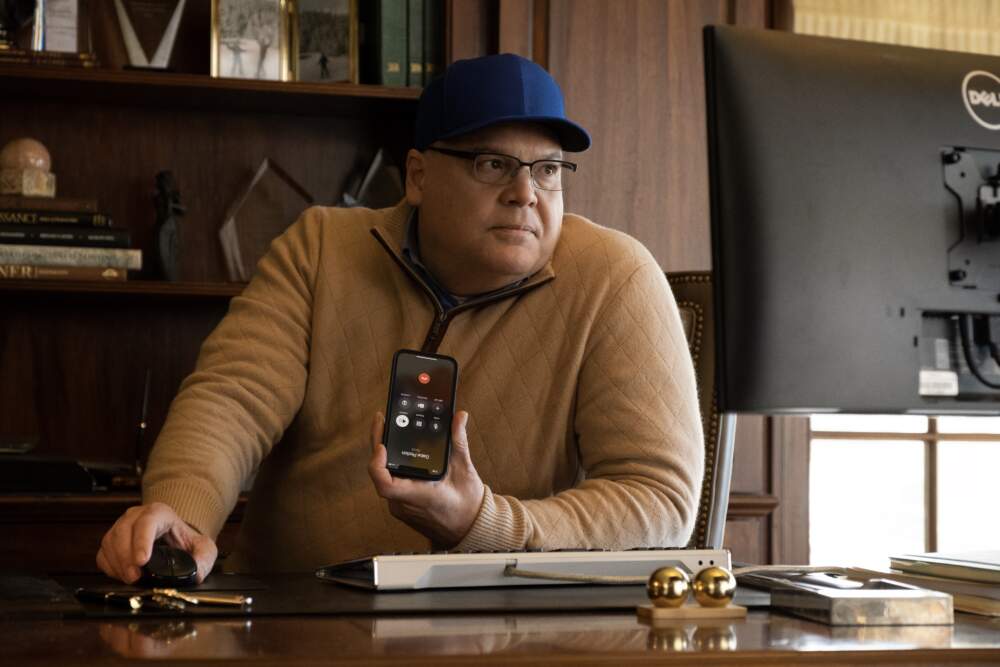Advertisement
Review
'Dumb Money' sidesteps the reality of the GameStop short squeeze

Good stories don’t always make good movies. “Dumb Money” is a great story, one you probably remember. Back in January of 2021, a bunch of vulture capitalist hedge fund managers had a very bad couple of weeks when the GameStop stock they were shorting became a craze among retail traders and Redittors who frequented the Wall Street Bets forum. The online community, no doubt fueled by nostalgia for the video game stores of their youth, decided to pitch in with their stimulus checks and often meager savings to rescue a beloved brick-and-mortar operation that had been targeted for extinction by billionaire fatcats. It’s an irresistible hook — a David and Goliath story for the internet age — so compelling that Boston’s own Ben Mezrich sold the film rights to his book “The Antisocial Network” before a word of it was even written. The problem is, there’s not really a movie here, at least not as adapted by screenwriters Lauren Shucker Blum and Rebecca Angelo. “Dumb Money” is mostly montages of news footage and memes interspersed with a few scenes in which famous actors look at their phones and swear.
Paul Dano plays Keith Gill, the David in this scenario. He’s a Brockton native who worked for Mass Mutual during the day and, by night, donned a bandanna to become Roaring Kitty, a YouTuber broadcasting out of his basement while wearing a dazzling array of tacky cat shirts. Keith went all in on GameStop, investing his family’s $50,000 savings while the rest of the world considered him insane to back an obsolete mall-based business during a global pandemic. Gabe Plotkin certainly thought so. Played without much personality by Seth Rogen, he’s the head of Melvin Capital, a multibillion-dollar hedge fund that bet way too much on GameStop’s failure, not realizing until too late that the wrath of Redditors is no trifling matter. And as you might remember from Margot Robbie’s bathtub lecture in “The Big Short,” the losses on such a gamble can arc upward into infinity.
Director Craig Gillespie of “I, Tonya” and the excremental miniseries “Pam & Tommy” specializes in smarmy takes on true-life tales, and he tries to turn the GameStop saga into a slobs-versus-snobs comedy, albeit one suspiciously short on jokes. The bankers are all avaricious sociopaths. A billionaire played by Vincent D’Onofrio is first seen literally feeding a pig in his kitchen, while the retail investors are depicted as humble, salt-of-the-Earth types who, despite hanging out on a message board rife with misogyny and antisemitism, exhibit none of those characteristics themselves. We spend the most time with America Ferrara’s valiant frontline nurse, a single mom trying to rustle up money for her kid’s braces, delivering speeches similar to her “Barbie” monologue about how impossible it is for regular folks to make ends meet these days. (I guess this is just what America Ferrara does in movies now.)

It’s telling that the nurse she’s playing is a die-hard Trumper in Mezrich’s book, a trait carefully omitted from the adaptation. Kind of like how the book’s white Duke student buying GameStop stocks with a $6,000 loan from his father becomes an interracial lesbian couple (played by Myha'la and Talia Ryder) saddled with student debt. These characters have all been strategically finessed to make the movie as palatable as possible, shrugging off the harassment and death threats received by Plotkin and leaving out pesky little details like financial guru Michael Burry (the weirdo Wall Street visionary played by Christian Bale in “The Big Short”) buying a big stake in GameStop. According to “Dumb Money,” this was all merely a matter of decent, hard-working Americans sticking up for a beleaguered small business. You realize how much perspective the picture is missing when Elon Musk and Dave Portnoy are held up as avatars of righteousness.
It's also inherently undramatic, bouncing around the country between disparate characters who never meet. (The Brockton scenes were shot in New Jersey. Early on, an NJ Transit train is supposed to pass for the MBTA. We can tell it’s not the T because it’s working.) All of the action revolves around these people not selling their stock, so we watch them watch numbers go up for most of the movie. I daresay “Dumb Money” sets a new record for the amount of screen time spent digitally inserting movie stars into previously televised news programs and interview shows. (It also might set a new record for the amount of screen time spent watching people watch television.)
The one-note characters remain unchanged throughout the picture. The only growth is in their bank balances. Except for Keith’s brother, a comic relief sidekick invested with a surprising amount of soul by Pete Davidson. He’s a DoorDash driver usually seen snacking on his customers’ food — monstrous behavior during a pandemic — learning to be a little less of a jerk while firing off a ton of obviously improvised one-liners. (Davidson’s crush on AOC is the most relatable he’s ever been.)

“Dumb Money” tries to drum up some drama in the final reel with a bogus suggestion that Keith could go to jail for securities fraud, something he was never in any danger of, but the movie needs to make a big crowd-pleasing moment out of his testimony before Congress in order to distract us from the story’s actual downbeat ending. The GameStop short-squeeze was brought under control when the Robinhood trading app temporarily shut off the ability for its customers to buy any more meme stocks until the hedge funds had covered their positions, a screamingly obvious case of collusion that remains uninvestigated and unpunished. Instead of stoking outrage, the movie declares victory and sends us out with a feel-good montage showing how much money these nice people made, life-changing sums that would barely constitute a rounding error for the Gabe Plotkins of the world.
There’s a darkness to the GameStop story that the movie — and Mezrich’s book, for that matter — are careful to sidestep, one that could only come out of a very scary and stupid time in America. Stir crazy from COVID-19 and furious about the inequities it laid bare, a mass movement of citizens got angry enough to stubbornly pass up enormous amounts of money they could have made by selling, all for the sake of screwing over the rich bastards they saw profiting off the pandemic. There’s a seething anger out there that hasn’t gone away, and if things don’t change, it could be channeled into something far more dangerous than rescuing a video game franchise. But “Dumb Money” doesn’t dare go there. I mean, the movie takes place in January 2021, and nobody even mentions what else is in the news.
“Dumb Money” is now in theaters. Author Ben Mezrich will be at the Coolidge Corner Theatre for a Q&A following the 7 p.m. show on Friday, Sept. 29.
